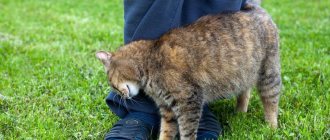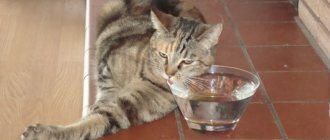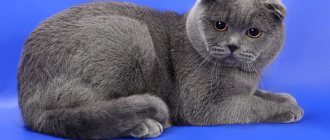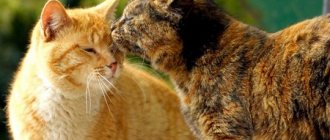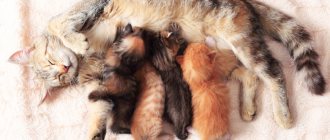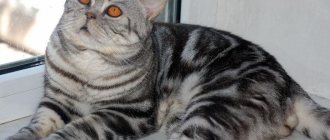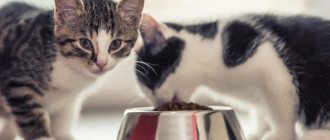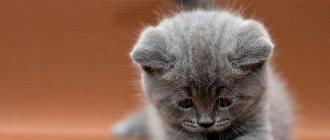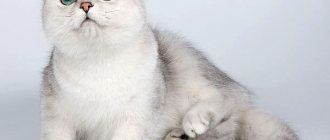The cat is picky
What to do if the cat doesn't eat? Very often, owners are faced with a situation where tailed animals are simply picky, because they know that a person will do anything for their beloved pet, even change the food until he puts in the one that he likes. If you feel that this is the reason for refusing to eat, half an hour after the cat has not eaten or eaten little, remove the bowl and do not give anything else. Let him go hungry for half a day and be nervous that they took away all the food. After this, when you put out a new bowl, the cat may change its anger to mercy and gobble up everything left.
Poisoning
One of the most common reasons why a cat drools is poisoning. Moreover, we are not necessarily talking about stale products, which the pet is unlikely to get at home (but it’s easy to pick up some nasty stuff on the street). A cat can be poisoned by medications, flea treatment if used incorrectly, household chemicals, chocolate, and other food that is not intended for the stomach of a small predator.
When poisoned, a cat drools heavily, experiences vomiting and diarrhea, emetic convulsions, increased thirst, weakness, and a rise in temperature. In severe cases, fever, convulsions, paralysis develop, and the pupils are dilated (in case of poisoning with pesticides, mercury, etc.).
Preparing for death
This sign applies to very sick, weakened and old animals. A few days before death, a cat may stop eating as its vital energy fades, and cats, unlike people, do not tend to clutch at life when they feel the end approaching.
If you know that your cat has had its day, then loss of appetite is a sign that the time is near. Try to ensure maximum comfort for your pet and accessible drinking during these days. If she doesn’t want your caresses, then give her the opportunity to privacy. If, on the contrary, she needs extra attention, give it to her.
Diseases of the teeth and oral cavity
A cat refuses to eat or eats very little - bad teeth or oral disease can be one of the common reasons for this behavior in animals. In this case, there is a complete or partial refusal to take favorite treats. The most common types of dental and oral diseases that can cause a pet to lose its appetite are:
- Excessive tartar deposits, which damage the gums, buccal mucosa and tongue, causing excessive salivation, chomping and painful sensations when chewing food. Putrid breath is the main sign of the disease;
- Poradontitis is inflammation of the gums and oral mucosa, which may precede the development of fistulas in the nasal cavity and orbit of the eyes;
- A viral infection that affects the oral mucosa, resulting in the formation of small ulcers that make it difficult to eat
Contacting a veterinary clinic will help to timely identify the initial stage of diseases through differential diagnosis and select the correct treatment for a full recovery.
How does the condition manifest?
In cats, periods of increased activity are usually followed by apathy and drowsiness. It is difficult for owners to understand why and at what exact moments this happens. Therefore, a situation where a cat is lethargic, hardly eats and sleeps a lot, is alarming.
The owner should clearly know that poor appetite and less active behavior do not always indicate an illness in the animal. And the veterinarian is sometimes unable to understand why the cat is lethargic. The observations of an attentive and loving owner are extremely important here.
The main signs of cat health, in addition to good appetite and good spirits, are:
- shiny and smooth coat;
- pink and slightly moistened mucous membranes;
- cold and slightly damp nose (normally, during sleep it can become warm and dry);
- pulse, respiratory rate and temperature are within normal limits;
- absence of excessive discharge from the eyes, ears and nose, plaque in the mouth, salivation and unpleasant odor from the mouth and ears.
It is important! The normal duration of rest for a cat per day is 12-14 hours or more.
Possible pathological conditions
If the cat has been lethargic for several days, sleeps a lot, drinks and eats poorly, and can barely walk, the owner should under no circumstances let the situation take its course. Such a condition in the pet’s body most likely signals the development of a serious disease. The cat must be shown to a doctor in the next few hours.
Anemia
Anemia occurs when a cat's body produces less red blood cells and hemoglobin.
In addition to the fact that with anemia, a cat is lethargic and sad, it also exhibits other signs of this unpleasant disease:
- the nose becomes lighter;
- mucous membranes acquire a bluish tint;
- blood pressure decreases;
- the pulse is sometimes rapid, sometimes rare;
- breathing accelerates, shortness of breath appears;
- the fur becomes dull and may fall out;
- clear discharge appears from the nose.
Diseases of the cardiovascular system
If the cat eats poorly and constantly sleeps, is lethargic, tries to walk less - these may be signs of the development of a disease of the cardiovascular system.
Your pet may be bothered by fluctuations in blood pressure.
It is important! Normally, blood pressure in cats can “jump” from 105/65 to 135/95 mmHg.
With high blood pressure, furry couch potatoes experience:
- lethargy;
- decreased vision (while moving, the cat may bump into furniture and other objects);
- rapid pulse;
- dilated pupils;
- redness of the eyes;
- sometimes vomiting;
- in some cases - nosebleeds.
With low blood pressure, the pet refuses to eat due to nausea, sleeps a lot, its pulse slows down, and the cat may even lose consciousness.
In acute heart failure, the animal is also lethargic, its breathing becomes difficult, shortness of breath and bluish discharge from the nose appear.
An important symptom of the development of heart disease in a cat is its characteristic posture in a relaxed state. She usually stands with her front legs spread wide. This makes it easier for her to breathe.
Gastrointestinal diseases
Often the cause of a pet's lethargic and sleepy state and his refusal to eat are diseases of the gastrointestinal tract.
With gastrointestinal pathologies, a cat may exhibit symptoms:
- bloating;
- stools that are very dark, almost black, or mixed with blood and mucus;
- belching;
- constipation;
- flatulence.
Diseases of the urinary system
The development of urinary system diseases in cats, in addition to a lethargic state and lack of appetite, is accompanied by symptoms:
- too frequent or infrequent urination, or its complete absence;
- constant pain when urinating;
- the appearance of blood or pus in the urine;
- sweetish smell from the mouth;
- lower back pain;
- extremely unpleasant odor of urine.
To reduce pain at least a little, the animal lies down almost all the time, does not drink or eat.
It is important! If your pet has a blockage in the urethra, without medical attention he may die within 3 days.
Infectious diseases
In many cases, a cat’s lethargic behavior, refusal to feed and staying in almost constant sleep indicate an infectious disease.
Such diseases are extremely dangerous for cats and require immediate medical attention. The owner must remember that the life of his pet is literally counted in minutes.
The most dangerous infectious diseases that cause cats to become very lethargic are:
- Leptospirosis: Caused by the bacterium Leptospira. The disease affects almost all cat organs and is very dangerous for humans;
- Calcivirosis is a viral disease that affects the respiratory tract. It occurs mainly in cats under 2 years of age, but sometimes in older individuals;
- FIV is feline viral immunodeficiency: an extremely dangerous disease that affects the immune and nervous systems. Only representatives of the cat family, including wild representatives, can become infected with it;
- Panleukopenia (popularly called feline distemper) is a deadly disease that develops very quickly. It affects the cardiovascular, digestive and respiratory systems of the cat and is accompanied by intoxication of the entire body;
- herpes virus infection (another name is rhinotracheitis): caused by the feline herpes virus. Affects the respiratory and visual organs. If the animal is weakened by other diseases and does not receive proper treatment, the infection can lead to death.
The main signs of a cat becoming infected with a dangerous infection:
- lethargy and apathy;
- lack of appetite;
- high body temperature (above 40°C);
It is important! Normal body temperature in adult cats is 38-39°C, in small kittens – 38-39.6°C, in sphinxes – 38-41.5°C.
- labored breathing;
- cough and wheezing;
- vomit;
- foul, greenish diarrhea;
- bloody discharge from the mouth, nose, ears, eyes;
- soreness in some parts of the body.
Intoxication
Poisoning of the body (intoxication) in cats, in addition to lethargy and refusal to eat, is indicated by:
- diarrhea;
- vomit;
- increased salivation;
- increase or decrease in body temperature;
- redness or blueness of mucous membranes;
- constant feeling of thirst;
- convulsions and so on.
If you suspect poisoning, you should try to induce vomiting in the cat so that the body can at least partially get rid of toxins, and then take it to the veterinarian.
However, if more than 2.5 hours have passed since the poisoning, it is better to transport the pet to a veterinary hospital as soon as possible. After all, during this time, toxic substances have already spread throughout the circulatory system throughout the body.
In order to protect your furry pets from intoxication, you need to know its main causes:
- stale or poor quality food;
- contaminated drinking water;
- bites of snakes and poisonous insects;
- helminth infection;
- bacterial and viral infections;
- violation of hygiene rules when keeping animals;
- eating poisonous plants, fertilizers, chemicals;
- uncontrolled use of medications;
- individual intolerance to certain components of feed, hygiene products, etc.;
- exposure to toxic fumes from paint and varnish products.
Parasites
The cause of lethargic behavior and drowsiness can be a cat’s infection with external and internal parasites (fleas, ticks, worms).
Flea and tick bites cause itching and pain in cats. As a result, due to constant scratching, wounds appear on the skin, and the hair begins to fall out.
A cat with ear mites often shakes its head and scratches its ears, in which a lot of wax with an unpleasant odor can be found.
Cats infected with worms are often lethargic. Other signs of the disease:
- bowel disorder (diarrhea or constipation);
- vomit;
- itching and irritation in the anal area;
- temperature increase;
- bloating;
- the presence of eggs and particles of worms in the feces.
If external or internal parasites are detected in your pet, you need to begin exterminating them as soon as possible. The veterinarian will prescribe the medications.
The fight against parasites is very important, because they are quickly transmitted to both other animals and humans.
Causes of decreased appetite
There are quite a few factors that provoke a decrease in appetite in kittens. Some can be easily eliminated, while others are difficult to treat even in a clinical setting. Here are the main reasons:
- the animal eats poorly because the food does not suit it;
- decreased appetite is caused by changes in weather or living conditions (a kitten may not eat due to stress, just like a person);
- the owners overfeed the pet, and it protests, showing poor appetite;
- the baby doesn’t get enough attention or play and is sad, feeling bad “morally”;
- an infection has entered the body;
- there is any disease of the gastrointestinal tract, so the kitten refuses to eat;
- the animal eats little due to food poisoning.
If the kitten begins to eat poorly, you definitely need to figure out why. Often you cannot do this on your own. In this case, a veterinarian will help.
Prevention measures
- Food and water bowls should always be clean.
- You need to purchase only high-quality food, ensuring its proper storage, and monitoring expiration dates.
- A systematic, careful examination of the cat will help:
- detect injury in time;
- make sure there is no damage in the oral cavity or teeth.
- It is imperative to regularly carry out preventive control against parasites , get vaccinated in a timely manner, and be examined by a doctor, especially if you have chronic diseases.
- Carefully examine the cat after a walk.
- Store chemicals for home care, plant care, and pest control products out of the reach of your cat.
The pet is naughty
If you are confident in the quality of the product you are using, do not rush to change it, even if your cat suddenly begins to eat poorly. Many owners begin to panic: they try options from other manufacturers, then another type, for example, canned food or natural food. Such leapfrog can only do harm and further discourage the animal’s appetite.
Perhaps the cat is simply capricious because you often pamper it with treats (cat treats, food from your table). The cunning animal immediately realizes that it is not necessary to eat boring granules: all you have to do is meow pitifully and the owner will give you a “yummy” treat.
If your cat is not a good eater of dry food, we recommend eliminating all snacks and treats, especially when you are just starting to introduce him to a new type of food. As a last resort, you can skip a couple of feedings: usually after this, even the most capricious ones begin to crunch pellets briskly.
Signal of a foreign body entering the digestive tract
Most owners often encounter this problem, which is especially typical for playful cats of long-haired breeds. These could be small fragments of toys, small bones, or simply large accumulations of fur from the animal itself. The main signs for identifying this factor are attacks of vomiting that occur when drinking water and food, abdominal pain and difficulty defecating. With prompt diagnosis and timely removal of the foreign material, the pet will recover completely.
The dangers of not enough food for a kitten
An adult cat is able to survive for a long time without food or get by with a minimum of it. But for a small animal, nutritional deficiency can lead to serious problems. If a kitten does not eat anything or eats very little and poorly, this is fraught with:
- gastrointestinal diseases;
- anemia;
- pathologies of the liver and kidneys;
- breathing disorders;
- heart rhythm disturbances;
- developmental and growth retardation.
Of course, these complications occur when the animal eats poorly and eats little for quite a long time.
It happens that appetite disappears for just a few days, and then returns to normal. But if the kitten is thin and has not been eating well for a week or more, it’s time to sound the alarm.

